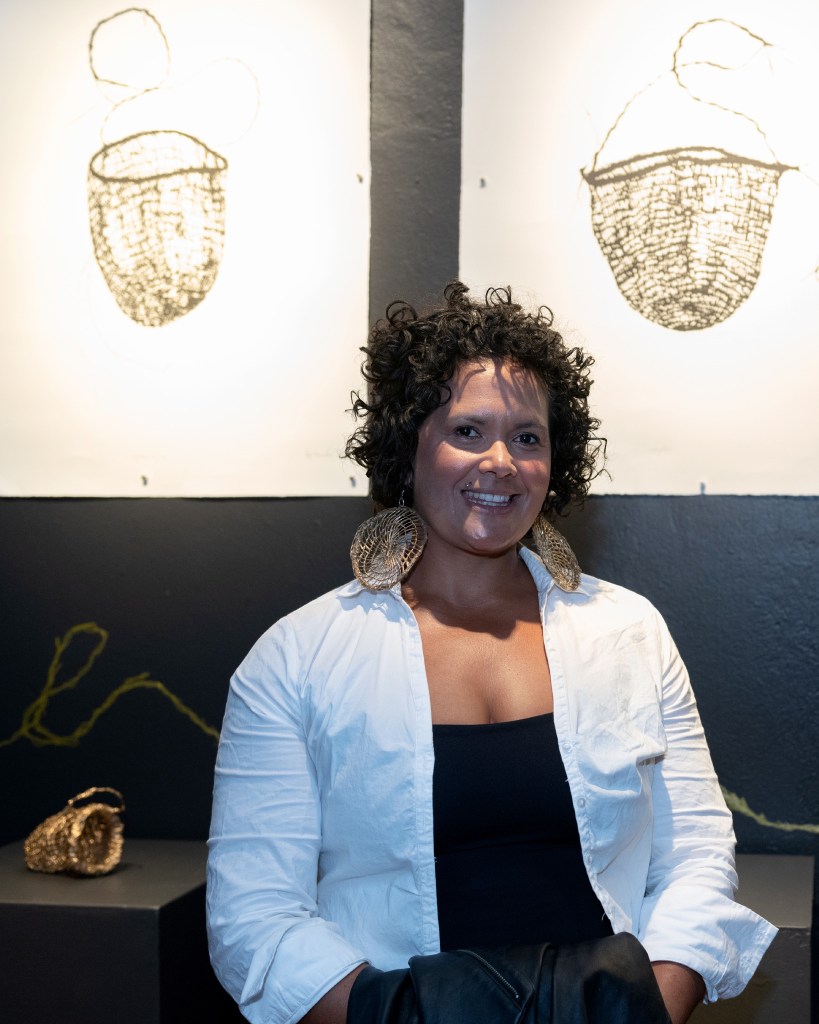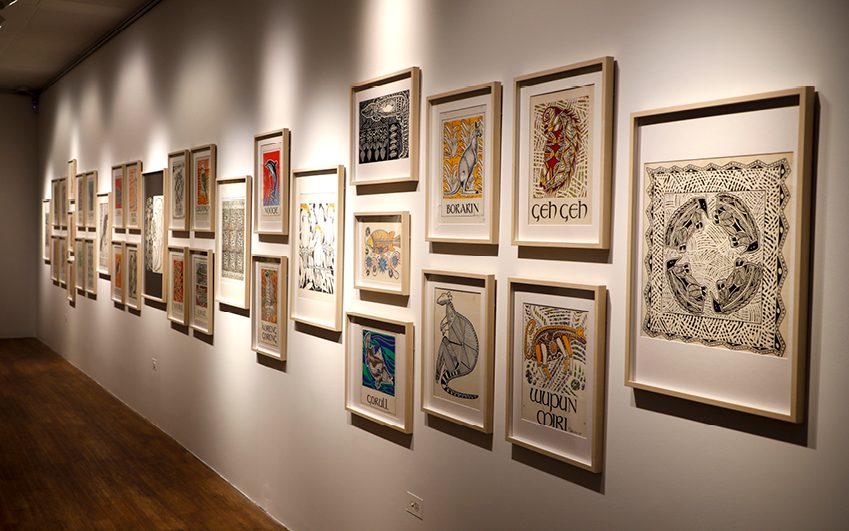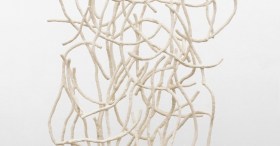Bundaberg’s Milbi Festival has been running for five years, since 2019. With a focus on First Nations arts and culture, it has developed into a major event for the area, celebrating a rich regional history. It takes place from the end of October to the beginning of November every year, coinciding with the start of turtle season. The Festival offers an array of events and activities, including arts workshops, concerts, and local storytelling and cultural nature tours.
The Milbi Festival of 2023 featured Wajgan’s Return at the Bundaberg Regional Art Gallery as its showcase exhibition. A true standout of the festival, the works of my father, acclaimed Aboriginal visual artist Ron Hurley, were displayed for the first time as a retrospective on Country – the Country of Ron’s matrilineal heritage, the nation of the Gooreng Gooreng people, of the Bundaberg and Gladstone areas.
Discussions about its development commenced two years ago between Bundaberg Regional Art Gallery Director, Rebecca McDuff and me as curator. The exhibition spanned four decades of Ron’s career, displaying a multitude of multimedia from canvas painting, etchings, lino and screen prints, drawings, ceramics and posters to sculpture, coalescing themes of gold, storytelling, legends, totems and politics.
As my father’s work is heavily focused on recognising, respecting and attributing to his ancestry, the overriding theme of the exhibition, coinciding with this year’s NAIDOC theme, ‘For Our Elders’, was an inspiration. The physical experience of viewing the exhibition gave viewers more than just a simple look at the artwork. Being in the presence of the artwork, feeling the texture and scale, and experiencing the atmosphere created by the arrangement of pieces are all part of the exhibition experience. It allows viewers to connect with the artwork on a deeper level and appreciate its beauty in a more profound way.
In addition to this exhibition, the Bundaberg Regional Art Gallery program gave audiences the opportunity to attend artists’ talks, providing a platform for artists to connect, engage and share their creative process, inspiration and ideas behind their artwork with patrons. Kuku Yalanji, Kabi Kabi, Gureng Gureng and South Sea Islander artist, Ivy Minniecon was invited to shadow Ron’s retrospective with her exhibition titled manjalba ngulkurrijin minday. Renowned Waanyi artist Gordon Hookey is famous for his satirical artistic cultural and political commentary.
On Saturday 28 October Ivy and Gordon joined me in delivering three artists’ talks, in the spirit of fostering a deeper understanding and appreciation of art and to encourage dialogue between artist and audience. In the shadow of the referendum result and living in an ongoing colonial era of “No”, we found ourselves engaging in conversations about the significance of regional arts, the need to support them, the importance of reciprocity and the impact of art education.
Art and reclamation
Art is often viewed as a form of cultural maintenance to preserve tradition. Art can also serve as a means of reflection and a critique of society, challenging existing norms and promoting social change. Overall, art plays a significant role in shaping and preserving the cultural heritage of a community. Ivy said she views her practice of weaving as a tool of healing, power and knowledge reclamation.

‘The physicality of squashing grass into a silk screen helps to get rid of that traumatic colonial experience,’ she said.
Gordon was right about protocols being an integral part of our culture and that, as an artist, you build on your work and the work of those who came before. As a curator and writer, it’s about learning from the past, taking inspiration from it, and then creating something new and innovative that adds value to the world.
‘It’s about honesty – a platform of honesty. We are a diverse culture. Through art, we are expressing our reality of what we see, what is now,’ said Gordon.
Reciprocity is a two-way street. Giving as much as you receive in any kind of relationship or interaction is important. Gordon pointed out the irony of this that lies in direct view. As the art market continues to sell art from poorer communities at high prices, he believes a false representation of Aboriginal people exists.
‘We are makers of Culture. It is a dynamic and changing Culture. It’s about representing honesty. As I’ve said before, they want our spirituality, but not our political reality,’ continued Gordon.
For Ivy, Gordon and me, as First Nations artists, supporting regional arts is all about giving back to the community. Art accessibility is crucial for everyone to have the opportunity to enjoy and appreciate it. It’s unfortunate that many regional areas often get overlooked, as efforts to bring art to these areas can have a significant impact on their cultural development and enrichment. There was a reminder of our origins amid the dominance of capital cities and popular coastline areas over regional galleries and towns.
Gordon said: ‘When you look at it, most of us come from these towns, and we go to the city to build up their reputation and give them their art kudos, yet we are from places like Bundaberg, Cloncurry, Mount Isa, all these towns, and it is like giving back to where we come from. And for me, especially if your family are from there.’
Ivy said: ‘I love that giving back – it keeps you humble and grounded, coming back to these spaces where we started off as kids and grew up in. It is deadly when you see Elders and mob that you know, familiar faces coming in to celebrate something that is so important to you, and important to them because you are bringing back traditional knowledge, or just art in general.’
While the referendum was viewed as just another bureaucratic process forced upon us and something that should have just been legislated, we recalled our lived experiences of life in regional Australia. Queensland registering the highest “No” vote percentage in Australia is not surprising to us. The long-lens negativity that First Nations people have seen is nothing new. In the spirit of honest representation, perhaps a new ad campaign awaits… “Beautiful one day, racist the next”. Our sovereignty is considered our ultimate authority, and for us to obtain consent or permission was not deemed necessary.
Read: First Nations Artists on the Voice
‘You know, when you grow up in these regional places, the racism is real and people don’t expect you to get to these places. Where we have come from to where we are now is a reminder to them that this is our place, is our space too. And we have every right to be here,’ said Ivy.
Gordon added: ‘To me, it is another exposé of who they are, and that tells me that our work is not finished and the generosity of those coming after us have to work hard too.’

When asked about the best way to support First Nations arts and culture, the simple answer was to embrace it – for people to do their own research and educate themselves. Whether it be a woven basket, an animal print or a painting, our sovereignty is represented through every genre and medium of our art practice. What we produce is a record of history and our contemporary First Nations lives and experiences.
‘We build on what has been done in the past. Even though we are accumulating our own practice, we are also doing what artists like Uncle Ron Hurley, Gordon Bennett, Trevor Nickolls have done. All those who have gone before have made it easier for us to do what we do. So, our obligation really is to make it easier for the next generation to come. So that is part of being a black fulla I think,’ said Gordon.
My curation of the Wajgan’s Return exhibition not only follows a goal of my father’s work – to pay homage to our ancestry, Elders and people – but also is the obligation of continuity that I have to my Culture. Ivy, inspired by the use of gold in Ron’s work, reclaims First Nations’ knowledge of healing intergenerational trauma through her weaving. While Gordon’s play on “the language of the colonist” with his brilliant application of humour, colour and text seduces the viewer.
He explained: ‘Unbeknown to them, they are receiving all these other messages as well, but it’s too late. They have already smiled or chuckled at something as well. I deal with an ugly truth, an ugly horrific, terrible truth, in a beautiful way. The nature of my work is inclusion, not exclusion.’
As Gordon’s words on “our political reality” echoed in the minds of the audience, the discussion came to a close, leaving them much to reflect upon.
Milbi Festival ran from 27 October to 5 November 2023 at various venues in Bundaberg.
This article is published under the Amplify Collective, an initiative supported by The Walkley Foundation and made possible through funding from the Meta Australian News Fund.





